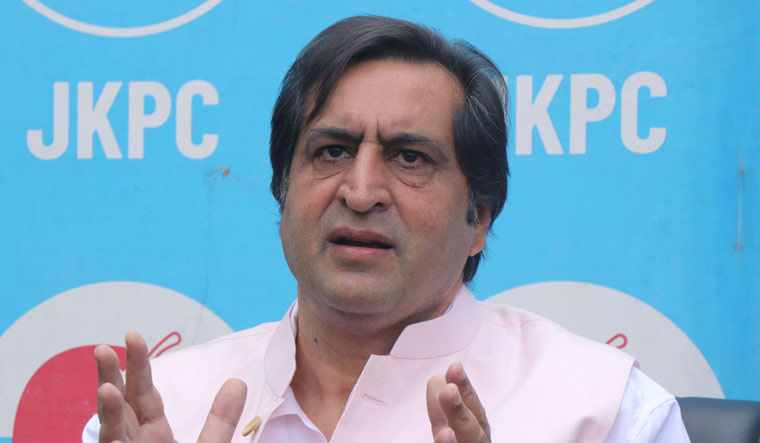Srinagar, May 28:Peoples Conference President and MLA Handwara Sajad Lone has issued a stark warning about the current trajectory of reservation policies in Jammu and Kashmir, warning of long-term societal consequences as the contentious issue prepares to resurface for discussion.
“The issue of reservations is all set to come up for discussion again. I will be honest. I don’t have a lot of hope,” Lone stated. “The committee formed by the present government is a typical run of the mill, time buying, excuse-making bureaucratic gibberish. It will end up with either seeking another date or come up with a statement mired in ambiguity, or a decision to make one more committee.”
The senior politician didn’t mince words in his criticism of the current administration. “The government neither has the brain nor the brawn. You really do need brains to understand the complexities of reservation in J&K. And you need a lot of brawn to take a principled stand on it.”
Lone accused the government of prioritizing electoral considerations over genuine social reform. “From what I have understood, the present government is blinded by lust for votes. They can’t see beyond the ballot box. And reservation for them is more about electoral arithmetic than social upliftment or merit,” he said.
He elaborated on what he sees as the government’s cynical political calculations: “Their private assessment is that these open merit wallas don’t queue up to vote. Their numbers may be huge but they don’t translate into a vote bank and are marred by ideological heterogeneity. They are not a homogenous vote bank for the political class. So why take the trouble??”
Lone characterized reservations as a defining challenge for post-independence society. “But reservations, I believe has emerged as the biggest challenge to us as a society, post 1947. We have to look at it objectively and comparatively. Objective evaluation would mean assessing the costs inflicted upon society by suppressing merit. And comparative evaluation would mean assessing factors specific to J & K.”
He emphasized the broader implications beyond individual employment opportunities. “I refuse to trivialise the concept of reservations by relegating it to snatching employment from person A and giving it to person B. That is a part of the problem. The damage is much more.”
Further, JKPC President argued for balance in reservation policies, warning against excess. “Reservations have to be at an optimal level. They cannot be excessive. Excess of reservations crowds out talent, disincentivises intellect, and sets in motion a process which subjugates meritocracy for all times to come.”
Drawing parallels with global powers, Lone stressed the importance of merit-based selection. “Nations are built by outstanding young men and women who excel in their chosen subjects. The whole concept of schools, universities, examinations, academic specialisations is to have system in place which identifies these outstanding intellectuals in different fields. Nations are built by these rarest of rare supremely superior intellectuals, identified in a rigorously competitive system of selection.”
“Britain became Great Britain by putting together a team of great scientists, engineers, doctors, military scientists. Ditto for America. Ditto for Europe. Imagine these countries having reservations of the level that we have at the moment. All these great people would have been filtered out,” he continued.
Moreover, he warned of the consequences of excessive reservations. “Excessive reservations result in mediocrity. And a permanent filter to filter out anything which remotely resembles excellence. There is a societal threshold to tolerate mediocrity. Mediocrity has to be the exception not the rule.”
Lone highlighted the unique complexity of reservations in J&K, suggesting ulterior motives behind current policies. “Out here in J & K, reservations is not a stand alone social tool in totality. It is unfortunately also a political tool; it is regrettably also a retributive tool. The planners and perpetrators are in search of a new normal in the society and reservations is their magical reset button.”
“It is less concerned with upliftment and more preoccupied with settling scores with a particular ethnic group and a particular geographical area,” he alleged.
The MLA also criticized local governments for their role in the current situation. “And the local governments have willingly become a pawn in the hands of the masters in the past and are partly responsible for the excessive dose of reservations.”
Despite his harsh critique, Lone expressed some optimism about finding solutions, while taking another swipe at the current administration. “Rationalisation in reservations is actually a challenge for any government, let alone a lame duck, fumbling and bumbling and mumbling miracle of a government like ours.”
“I am convinced there is a solution. And for that you need to be able to comprehend the problem in all its shades and forms. And you also need the will and courage to take on those who want to script a new normal in our society,” he said.
He concluded with a stark warning about the broader implications of the reservation debate. “The problem of reservations is simply not about numbers. It is much more. And it is a post dated cheque for disaster. Societal resets have not worked anywhere in the world and will not work here.”







